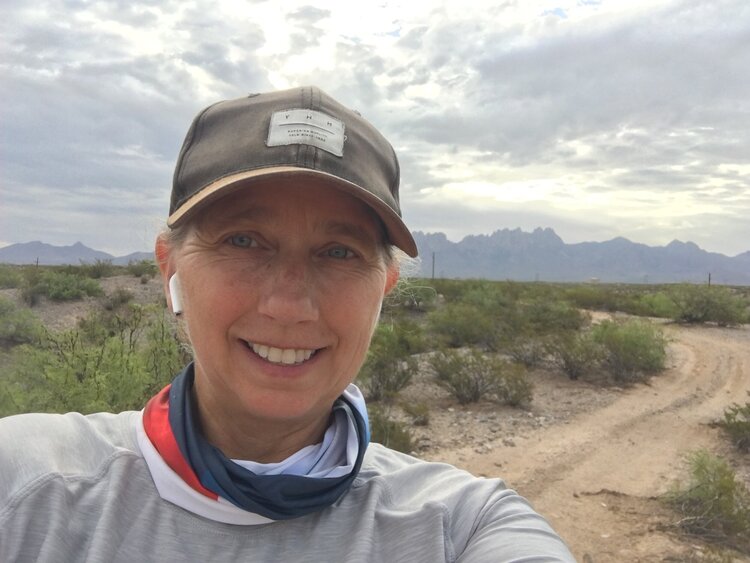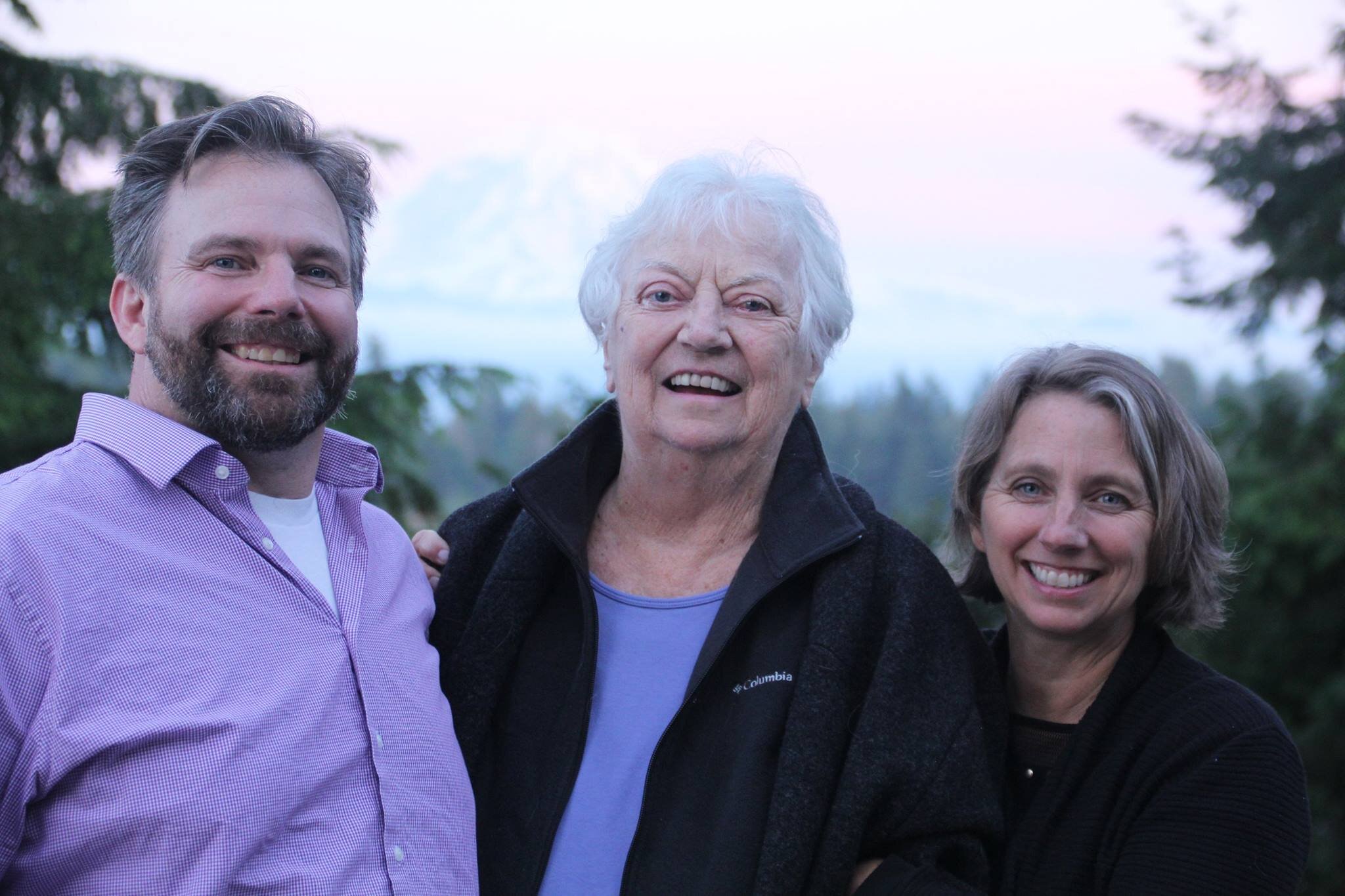Cancer.
I was presenting a workshop at an educators’ conference when I received a concerned call from my brother: My Mom was headed to the ER for starvation and malnutrition. The speed of diagnosis was stunning. In the time I walked from the conference hall to my hotel I received messages indicating that my mom had lung cancer which had metastasized to her brain. She was being prepped for surgery to remove a brain tumor. No time to think about it or process it. How quickly could I get from Bangkok to Chicago? 2 days waiting for a flight, then 36 hours of travel.
Thankfully my brother, Andrew, is with her. He reports updates. She is out of surgery and the surgery went well. He tells me that right after the surgery she asked the doctor, ““While you were in there did you add some extra intellect?” The fact that she’s already joking with the doctor fills me with hope.
By the time I arrive, she’s been transferred from the hospital to the rehab center. She’s weak. The scar from her neck to midway up the back of her head makes me cringe. It’s shockingly huge and those 19 staples also seem enormous, as though they were inserted with a staple gun. Her hair is matted and unwashed, as the wound shouldn’t be soaked. I’ve never seen her this weak before. She can’t walk. She’s always exhausted. She wants to sleep after the smallest exertion. Is it a result of the brain surgery or the cancer that’s surging through her body? At one point she says to me, “It’s one thing to talk about how we’re all eventually going to die one day but it’s a whole other thing to be staring it in the face”. So, I know she’s thinking about death too.
She’s always been invincible to me. Immortal even. Until now.
Stage 4 lung cancer with metastasis to the brain. Of course, that means it’s other places too. I mean it only takes our blood 1 minute to circulate through our body. Those cancer cells are probably everywhere. The doctor used the word “incurable”.
Social protocols are out when you have cancer and you’ve just had brain surgery. Strangers help you with showers and going to the bathroom. You don’t care if anyone sees you naked. You let the farts flow freely. You’re not aware of your body odor. Your daughter wipes your butt. The roles are reversed now. Children taking care of parent. Children arranging doctors’ appointments, discussing care plans, making decisions about showers and meals.
On one hand, it’s heart-wrenching but on the other hand it’s so natural. My brother and I work side-by-side arranging financial plans and medical treatments. We begin discussing plans for the house. Memories flood in as I walk through the house and discover stacks of photos from years passed hidden in basement cabinets.
We decide to move our mother to be closer to my brother in the Seattle-area since I was living in Saudi Arabia at the time with a planned move to Peru in a few months’ time of this surgery. Our Mom has no desire to even return to her house. She doesn’t even want to say good-bye. She makes a few clothing requests for the suitcase I’m packing. In the basement, I spot her framed Master’s degree from Cornell University. I am prompted to add it to the suitcase so I throw it on top, last minute.
We leave from the rehab center to the airport and go straight to the new rehab center in WA. My heart aches as the nurses quiz my Mom. It seems so patronizing. I just want her to have dignity. I decide to unpack and unzip the suitcase and the diploma stares out at us. One nurse steps over the suitcase and exclaims, “Oh, a degree from Cornell. You are a smart woman!” and the tone changes. Suddenly there is so much more respect. On one hand, I’m glad for my Mom but on the other hand I’m thinking, “It shouldn’t take a degree to receive respect” and I’m sad for everyone else.
It’s nearly impossible to leave her there as I journey back to Jeddah. At least my brother and his family are near. We talk every day. Though her spirits are high, the decline is apparent. I spend several weeks in the summer clearing out her house. Several angels help me with the monumental task, including my husband and a dear friend of hers who is now a dear friend of mine. Then I have a glorious month with my Mom in WA, including a couple of weeks with my daughter there as well. The 3 of us go to doctor’s appointments, play Scrabble, watch the classical music channel, talk, laugh, joke, explore and eat copious amounts of Ben and Jerry’s ice-cream. It’s such a beautiful time that I will forever cherish.
I’m only a few weeks into my new job in Lima, Peru when once again, I receive news that there is another brain tumor. I fly out immediately and arrive the day before her 2nd brain surgery. My son has been there for a week while my brother was on vacation. When I enter the hospital room my Mom exclaims, “You came!” It’s clear she’s happy and grateful to see me but the conversation is difficult and she is so confused. We order a meal and she reaches over her plate to eat off of my plate which is so uncharacteristic of her. The brain tumor is wreaking havoc on her mind. As the doctor prepares to take her for surgery, I say good-bye to her at the elevator and I sense that I might not see her again.
The next day after surgery my son and I go to her room with great anticipation of her recovery. But she is yelling and screaming and trying to get out of the bed. She is in fight and flight mode. It’s not her anymore. Each day passes with no change. At one point the nurse turns to me and says, “This might be the new normal”. I am devastated. I am referred to Hospice and we enter their program.
My son and I spend all day with her, trying to reach her mind, trying to trigger a response. But she’s essentially gone. At night I stay with her on a rollaway bed and he returns to her apartment to sleep. Several days into Hospice my Mom becomes lucid. She sits up and wants to walk a little bit. My son supports her. She recognizes both him and me and talks with us and expresses her love for us. The Hospice nurse is in tears and tells me to call my brother. I mention he’s on vacation and she urgently counsels, “Call your brother now” so I heed her advice. I reach one of his sons in their room on the cruise and he takes off to find his Dad. Within a few moments Andrew is on the phone with our Mom and she recognizes his voice and tells him she loves him. It was a cherished, loving and warm time. Then she was vacant again. My son returns home
Andrew and family arrive home on Friday night and they all come into the hospital room and say good-bye. Andrew and I set up camp in the room together. The next morning we tell our comatose mom that we are going to get something to eat but that we’ll be back. I want her to know that if she wants to move on to the next phase of life without us in the room, she can. She’s still alive when we return. We sit on either side of her and share memories about her with each other. About an hour later her breathing takes on “the rattle” I had read about in the hospice brochure. I look at my brother and state, “This is it. The time has come”. We each hold one of her hands and put our heads on her chest and express our love to her and tell her to “go to the light”. Then she’s gone. We sit together with her for about 20 minutes before we call the nurse.
Diagnosis in March, death in August. I’m grateful it was fast and my Mom didn’t suffer much. But the hole will never close. I know that now, over 4 years later. I still experience something or have an idea and have the thought to call my Mom.
Sometimes if I want to think of her, to feel her, I watch the video I made at her funeral. It fills me with memories and love and always results in a good cry. I’m grateful for this compilation I made. I’m grateful for my Mom and the influence she had on me and subsequently on my children. I’m grateful for the doctors who helped us and did their best to help my mom fight an incurable cancer. And, I’m grateful for Hospice and how they helped us transition our Mom through the process of death. I'm grateful I had my brother to share the grief. I hope that everyone out there struggling with cancer themselves or with cancer of a loved one can find peace, strength, and support in their journey, whether it be recovery or death. Either way, it’s tough.
Less than a month before her death, with my brother and me.

